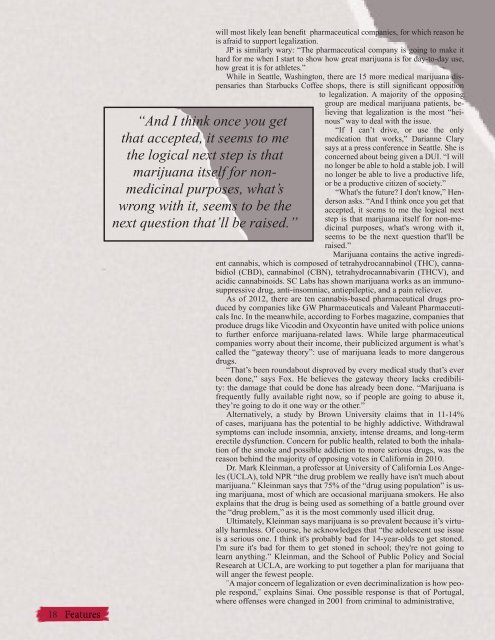About that Vaccination...
Create successful ePaper yourself
Turn your PDF publications into a flip-book with our unique Google optimized e-Paper software.
18<br />
“And I think once you get<br />
<strong>that</strong> accepted, it seems to me<br />
the logical next step is <strong>that</strong><br />
marijuana itself for nonmedicinal<br />
purposes, what’s<br />
wrong with it, seems to be the<br />
next question <strong>that</strong>’ll be raised.”<br />
will most likely lean benefit pharmaceutical companies, for which reason he<br />
is afraid to support legalization.<br />
JP is similarly wary: “The pharmaceutical company is going to make it<br />
hard for me when I start to show how great marijuana is for day-to-day use,<br />
how great it is for athletes.”<br />
While in Seattle, Washington, there are 15 more medical marijuana dispensaries<br />
than Starbucks Coffee shops, there is still significant opposition<br />
to legalization. A majority of the opposing<br />
group are medical marijuana patients, believing<br />
<strong>that</strong> legalization is the most “heinous”<br />
way to deal with the issue.<br />
“If I can’t drive, or use the only<br />
medication <strong>that</strong> works,” Darianne Clary<br />
says at a press conference in Seattle. She is<br />
concerned about being given a DUI. “I will<br />
no longer be able to hold a stable job. I will<br />
no longer be able to live a productive life,<br />
or be a productive citizen of society.”<br />
“What's the future? I don't know,” Henderson<br />
asks. “And I think once you get <strong>that</strong><br />
accepted, it seems to me the logical next<br />
step is <strong>that</strong> marijuana itself for non-medicinal<br />
purposes, what's wrong with it,<br />
seems to be the next question <strong>that</strong>'ll be<br />
raised.”<br />
Marijuana contains the active ingredient<br />
cannabis, which is composed of tetrahydrocannabinol (THC), cannabidiol<br />
(CBD), cannabinol (CBN), tetrahydrocannabivarin (THCV), and<br />
acidic cannabinoids. SC Labs has shown marijuana works as an immunosuppressive<br />
drug, anti-insomniac, antiepileptic, and a pain reliever.<br />
As of 2012, there are ten cannabis-based pharmaceutical drugs produced<br />
by companies like GW Pharmaceuticals and Valeant Pharmaceuticals<br />
Inc. In the meanwhile, according to Forbes magazine, companies <strong>that</strong><br />
produce drugs like Vicodin and Oxycontin have united with police unions<br />
to further enforce marijuana-related laws. While large pharmaceutical<br />
companies worry about their income, their publicized argument is what’s<br />
called the “gateway theory”: use of marijuana leads to more dangerous<br />
drugs.<br />
“That’s been roundabout disproved by every medical study <strong>that</strong>’s ever<br />
been done,” says Fox. He believes the gateway theory lacks credibility:<br />
the damage <strong>that</strong> could be done has already been done. “Marijuana is<br />
frequently fully available right now, so if people are going to abuse it,<br />
they’re going to do it one way or the other.”<br />
Alternatively, a study by Brown University claims <strong>that</strong> in 11-14%<br />
of cases, marijuana has the potential to be highly addictive. Withdrawal<br />
symptoms can include insomnia, anxiety, intense dreams, and long-term<br />
erectile dysfunction. Concern for public health, related to both the inhalation<br />
of the smoke and possible addiction to more serious drugs, was the<br />
reason behind the majority of opposing votes in California in 2010.<br />
Dr. Mark Kleinman, a professor at University of California Los Angeles<br />
(UCLA), told NPR “the drug problem we really have isn't much about<br />
marijuana.” Kleinman says <strong>that</strong> 75% of the “drug using population” is using<br />
marijuana, most of which are occasional marijuana smokers. He also<br />
explains <strong>that</strong> the drug is being used as something of a battle ground over<br />
the “drug problem,” as it is the most commonly used illicit drug.<br />
Ultimately, Kleinman says marijuana is so prevalent because it’s virtually<br />
harmless. Of course, he acknowledges <strong>that</strong> “the adolescent use issue<br />
is a serious one. I think it's probably bad for 14-year-olds to get stoned.<br />
I'm sure it's bad for them to get stoned in school; they're not going to<br />
learn anything.” Kleinman, and the School of Public Policy and Social<br />
Research at UCLA, are working to put together a plan for marijuana <strong>that</strong><br />
will anger the fewest people.<br />
¨A major concern of legalization or even decriminalization is how people<br />
respond,¨ explains Sinai. One possible response is <strong>that</strong> of Portugal,<br />
where offenses were changed in 2001 from criminal to administrative,




